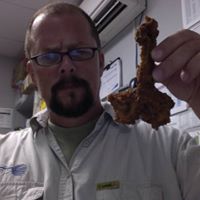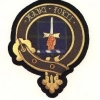Among some pundits, thinkers, and posters here, there’s been a certain level of criticism for the way many Americans, myself included, have reacted to the news of Osama’s death. I should say, I can in a sense understand where they’re coming from. It should always make us a little uncomfortable to find that we’re celebrating death and killing, no matter how vile the person being killed. I have seen more death and suffering than anyone should and I know well its stench. And I have been on the other end of the sight, looking death in the face and squeezing the trigger in response – there is nothing joyful about it. There’s no doubt that a world in which no killing was ever needed would be a better one, and the idea of celebrating someone’s death as though it represented some kind of satisfaction seems to miss the point of justice. And then there are the reports that folks are singing “We Are the Champions” at Ground Zero, which seems more appropriate for the aftermath of a Superbowl victory than to mark someone’s assassination – besides, we’re not the champions, the fight is far from over. Ideally, I would have spent the day with my fallen friends in Arlington. I offered some toasts in rememberance and spent some time at the local war memorial instead.
And yet, I don’t believe that people are wrong to react with a sense of elation and happiness at this news. Here are my preliminary thoughts on why.
First, Bin Laden’s killing today was not the same as an execution, not by any stretch of the imagination. This is a different scenario than the one which played out today. Osama Bin Laden was continuing to wage an active war on several fronts: against the United States, against many of his own countrymen, and against peaceful, mainstream Islam everywhere. Every day he was on the loose, he was likely planning to cause future bloodshed in America, working to disrupt peace processes in the middle east, and psychologically torturing young men and women into sending themselves to their own deaths. Unlike the hollow, symbolic act of an execution, the killing of a man actively plotting against you is no different striking down a foe in the midst of a battle. True, you can and should decry the fact that the battle took place at all. But I don’t believe for a minute that you can fault someone for feeling relief and even joy upon discovering that someone who posed a threat to their lives has been killed. I admit, after both serving in the military and now civilian public safety, I can feel the discomfort of knowing there are active terrorists out there plotting to kill random civilians much more personally, and I don’t like it. I deserve to be able to visit national landmarks and hang out in crowded spaces without having a little paranoid voice in the back of my head telling me that this is just the kind of time and place where a terrorist might strike. And even though it’s a small voice, and mostly an irrational one, it’s still true that I am safer today with Bin Laden dead than I was 24 hours ago. I do not apologize for wanting to celebrate that fact.
Next: the other statement that will be made by those who feel uncomfortable celebrating what happened today will be that justice cannot be served by what amounts to a battlefield killing, and that Bin Laden should have been captured, tried, and then dealt with by a court of law. To a certain extent, I agree with this, as I think many people would. As standard rules of engagement, I certainly presume that the orders of the men on the ground were to capture him if possible. But I have to say, while I’m almost always on the side of strictly upholding the rule of law, the killing of Bin Laden today was not the same as uncomfortable way in which terror suspects, many professing their innocence, have been denied due process in places like Guantanamo. Perhaps, in some technical sense, there is a similarity. But broadly and pragmatically, this is not the place to pick that fight. Osama Bin Laden had confessed in front of the whole world to both his past crimes and to his intent to commit more of them in the future. If there ever was a time when someone’s guilt was clear without need for a trial, this was one. Indeed, an attempt at a trial would likely have resorted in an enormous fiasco: Where would it be held? Whose jurisdiction and laws would apply? How could we really ensure the safety of those charged with guarding Bin Laden, or those in the jury, or really anyone in any way connected to the trial? Could we really justify putting their lives at risk in the name of giving due process in this most open-and shut of all cases?
The “war on terror” often looks very much unlike a war, and even when it does, it is often fought on the wrong battle fields, or in places where it is hard to tell whether the enemy is truly present, or who/what the “enemy” even is. But if there is one place where the “war” concept seems to me to apply, it is to Osama Bin Laden himself. As both a figurehead and an organizing officer, he was a general marshaling forces against you and me. He was not simply some former murderer on the run, being pursued so that he could be “brought to justice.” He was a man actively working to do harm to innocent people. Do I wish for a more ideal world where he could have been captured, tried without incident, and hung like Saddam? Sure. Do I dream of an even more ideal one where none of this even had to be debated? Of course. But do I regret in any way the feeling of security, relief, and redemption for my fallen brothers and sisters that I get from knowing that he is dead? Hell no. Not at all.
Finally, I don’t think it’s true that these celebrations are really a celebration of one man’s death. They are, to me, primarily the celebration of a stepping stone in a larger, more extensive mission: the eradication of terrorism in the world. And as long as you agree that this is a goal worth pursuing through military means, then I don’t think you can fault us for treating this as a symbolic victory along the way. We should ask ourselves how many times have we seen footage of a revolution someplace, in which a regime is toppled, a leader is killed, and the population responds with wild celebrations. Do we react to these scenes with the same kind of skepticism? Of course not. We recognize that these people are not celebrating deaths, but the completion of a goal, and the taking of a step towards a better world. That deaths were a part of that process is lamentable, but not cause to condemn the celebration. In those cases, we all understand their elation: you are free from your oppressors, your overlords, from the ones who seek to keep you in poverty and in servitude and perhaps even seek to eliminate your gender, your race, or your nationality. But how substantially different is what many Americans are feeling today? A sense that we toppled an evil figure whose shadow hung frighteningly and ominously over us, and that we helped send a message to future generations, that the evil tactics of terror and intimidation of innocents cannot stand?
I guess what I’m saying is this: if you want to split hairs about Americans’ motivations in reveling in this news, you can. It’s always uncomfortable to see people cheering at the news that someone was killed, even if it was under the guise of being “brought to justice.” I do not encourage killing as a way to make ourselves feel better about a past tragedy, not ever. It cannot and does not work.
But when an active threat is neutralized, and a man working every day to ruin the lives of not just Americans, but Afghans, Pakistanis, and countless other people is killed, are we not allowed a moment of satisfaction? Not because it changes anything about the past, or in any way lessens the sting of the old wounds. But because it means we can be safer, happier, and better able to pursue an agenda of peace in the future. This kind of celebration and happiness does not, to me, carry with it the darkness of a revenge killing. It is the opposite: not a hollow obsession with the life that was lost, but a meaningful recognition of the lives that have in all probability been saved.
It is not perfect. I can say from the depths of my soul that I wish lives never had to be lost in the pursuit of safety and harmony - no one detests war and death more than the soldier. But we live in an imperfect world where inevitably, they do. I make no apologies for the fact that tonight, I am thrilled that the life which was lost along that way belonged to a self-confessed murdered bent on killing again. There are so many lamentable deaths every day - it is welcome news that for once, one of them may help to save more lives than it cost.








